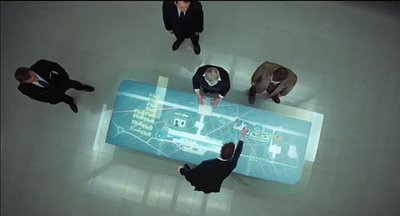Sorry I'm so late to the party on this one, but I thought I'd share some of the research I've found for a academic project, so here's my contribution.
KennyPeanuts and Wonko the Sane both give interesting examples, and Napoleon Wilson cuts to the heart of it, but all three answers hint towards but do not explicitly discuss the wider trend they are discussing.
Perhaps one of the most prevalent visual trends in modern cinema (and seems to be found across genre, not neccesarily limited to Sci-Fi) is a tendency towards...
TECHNO-FETISHISM.
Tecnho-Fetishism is a piece of wide terminology identifying behavior/preference that privileges the use/appearance of advanced technology, traditionally associated with the Sci-Fi/fantasy genre but more recently expanding across all areas of artistic/commercial enterprise.
Emergence/History
Techno-fetishism is inherently attached to the Computer-Age, but has only truly blossomed within the Modern (current) Information Age.
The concept of techno-fetishism is alleged to have been borne out of commerce, which is a problematic claim as it eliminates any notion of an organic cultural preference, in favor of a marketing model.
That being said, Tech Companies such as Apple and Samsung have seemingly identified this consumer trend, and appear to be exploiting it for commercial gain. This is probably due to more advanced technology being widely available within the domestic market, influencing notions of commodity.
Techno-fetishism is also closely linked to the legacy of Futurism, and the two terms can often be found being used interchangeably. This is fine, but Futurism is more of an aesthetic movement and Techno-Fetishism is considered a behavioral model.
Japan is obviously a huge proponent of the movement, both culturally and artistically. The Japanese term Otaku is a derisive description of a Tecnho-fetishist, although its negative connotations seem to have been lost in translation in the process of western circulation. There is a lot to be researched here, as Mecha-Anime is surely one of the most functionary conduits of the 'genre'.
In Movies
Modern 'Mainstream' Cinema, in a typical reflection of the modernity, seems to be adopting techno-fetishism reflexively.
It's perhaps still very early days, and hasn't seemed to have been fully explored/identified academically (hence my research), but technological interface seems to be a staple of many movies, sometimes the theme itself.
The Spike Jonze movie Her is a very interesting example, and perhaps ahead of its time (even though it is yet to be released!). Another good exploration of the way we interface with technology is The Entire History of You, a very good episode of Charlie Brooker's Black Mirror. The two are thematically similar, but seem to directly address modern cultures addiction to technology in a very mature way.
As Wonka the Sane skirted around, advanced technology is often 'air-dropped' into movies, and can often be jarring.
I personally think the high-watermark of this trend is Quantum of Solace, where the 'Sci-Fi table' seems to be a totally unnecessary demonstration of tech-for-the-sake-of-tech.

The MCU is a franchise that has readily adopted Techno-fetishism, and Iron Man remains the most exploratory of these trends. The Studio should be congratulated as a powerful example of how cultural preferences can be seamlessly stitched into pre-existing canon's, through camouflage and concealment.
It could be said that the different characters of of the MCU are on divergent paths that manipulate modern cultural trends:
- Iron Man-Techno-fetishism Tony Stark, is a GatesJobsian avatar of technology and commercial responsibility, being an representation of futurist altruism.
- Thor-Mysticism The Asgardian world is a beautifully rendered demonstration of Historical/Fantasy mysticism, and openly signals and engages fans of such a genre.
- Captain America-Nostalgia Whilst outwardly imperialistic, Captain America is actually a felicitous exploration of America's Modern Cultural identity by exploring old fashioned ideals of heroism. The First Avenger also capitalized in the 1930s/40s retro-styling that has emerged within wider fashion, a preference elicited by Vintage clothing.
I realize that the question you have asked is not about MCU, but I hoped to demonstrate how Iron Man is an example of a commercial entity recognizing and exploiting the very trend you have yourself identified, and demonstrating how it is only part of a wider marketing strategy.
In summary
The reason why there is so much 'Fancy Technology' in movies is because there is an active market for it, and movies will always respond to market forces favorably.
Mainstream Movies will exploit the visual language of technology, and more artistic features will criticize and explore our interaction with it.
This is nothing especially new, but it is accelerating in pace.

